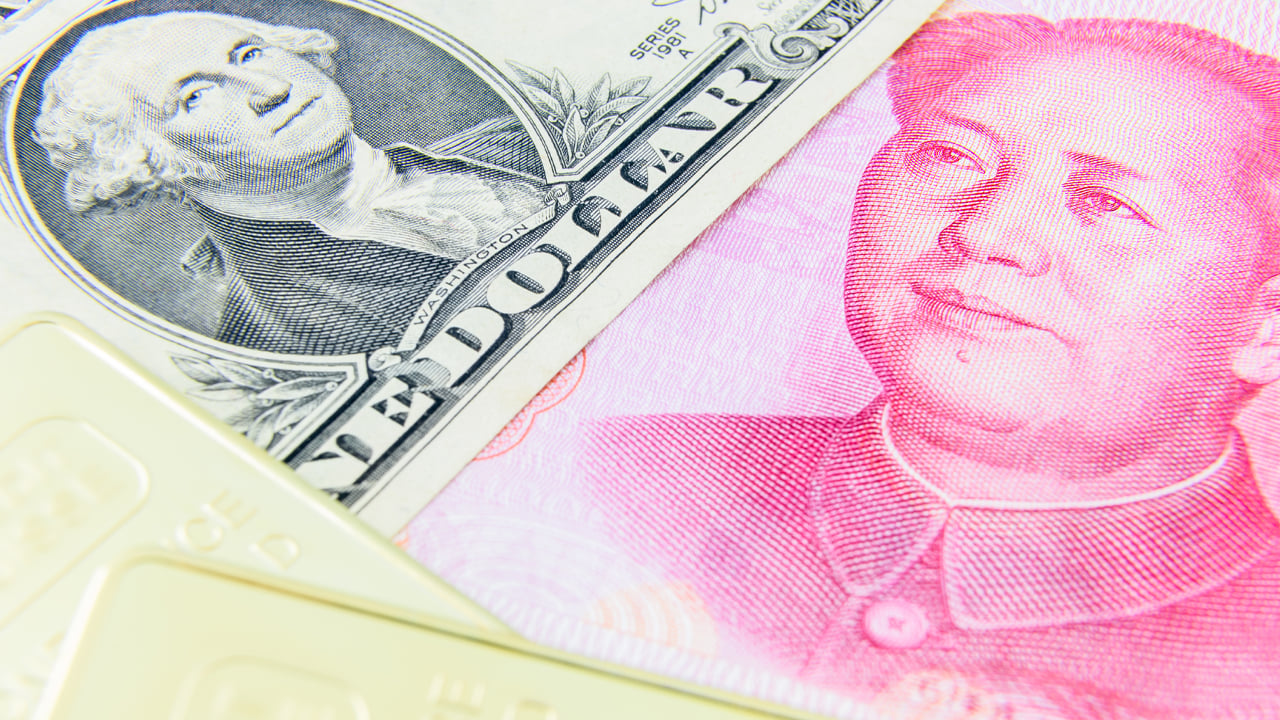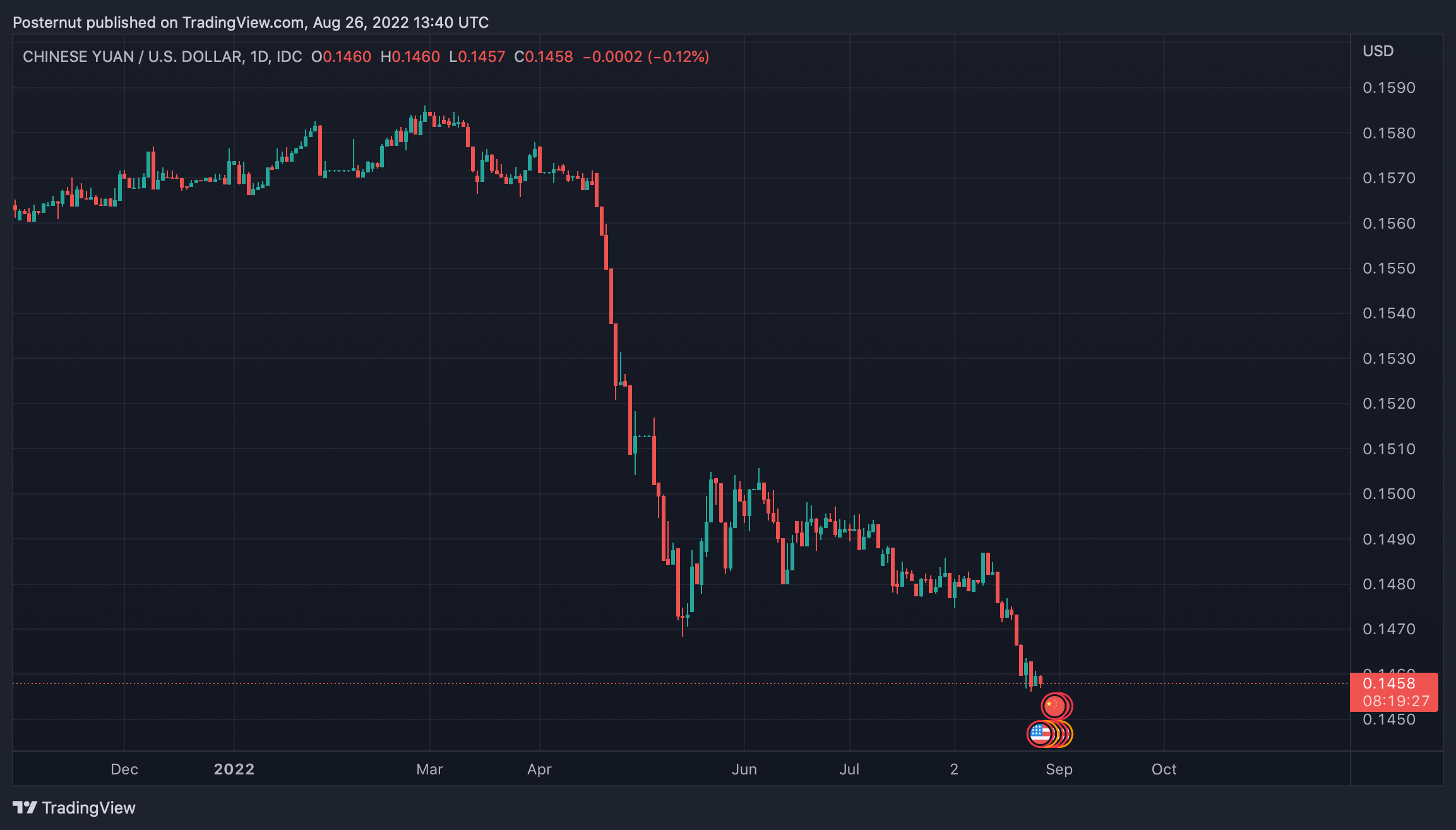
China’s sovereign currency, the yuan, has slid significantly in value during the last few months as it has shed 8% against the U.S. dollar during the first half of 2022. China’s fiat currency is currently the weakest it has been against the U.S. dollar in roughly two years. China has suffered a serious real estate crisis due to its overextended Chinese housing market collapsing amid the weakening yuan.
China’s Yuan Slides to a 2-Year Low Against the US Dollar, PBOC Slashes Rates to Bolster Liquidity
Global economic conditions are not good and cracks starting to appear in almost every country around the world. While the U.S. dollar is strong and the Russian ruble are solid, the Chinese currency has fallen against the greenback this week. This is worse than in the past two years. The yuan trades at 6.86 against the dollar as of the writing date, levels that have not been seen since August 2020. Of course, the country’s central bank, the People’s Bank of China (PBOC), has tried to bolster the yuan and the Chinese economy.

Less than a week ago today, the PBOC lowered the country’s benchmark bank rate from 2.1% to 2%. The PBOC also slashed its one-year lending rate from 2.85% down to 2.75%. At the time, the Chinese central bank explained the moves were made to “maintain reasonable and sufficient liquidity in the banking system.” China’s cabinet also published a new spending policy package, which aims to double infrastructure spending. The PBOC’s 2.1% to 2% rate cut was considered “bearish,” ING economists wrote in a note to investors after the central bank cut rates.
The PBOC lowered lending rates once again on August 22. It slashed the five-year loan interest rate from 4.45% to 4.30%. China’s central bank also revised the one-year prime rate to 3.65% from 3.70%. The same day, Atilla Widnell, a market analyst and managing director for Navigate Commodities, detailed in a note to investors that the central bank’s rate cuts the week prior did not see many positive reactions.
“Fresh monetary easing/stimulus was seen as futile as ‘flogging a dead horse,’ given that China’s economy desperately needs consumers back on the streets spending money,” Widnell wrote.
The Domino Effect of China’s Real Estate Issues, FX Watchdog Warns Several Chinese Banks Against Aggressively Selling Renminbi
China’s economic issues and the weak yuan stem from the country’s troubling real estate issues, according to a myriad of reports littered all over the web. Senior lecturer in economics and theconversation.com author Zhirong Ou explains that China’s real estate sector is a “traditionally strong housing market,” but these days the sector is stifled by a massive “funding crisis.” The domino effects have led to real estate buyers refusing to pay mortgages, while construction and development loans in the country have been overextended.
“The recent spate of mortgage strikes by homebuyers across China has exposed the risk that has accumulated in the market as it has developed over the past two decades,” theconversation.com’s author opines. Zhirong Ou also notes that although the Evergrande scandal was the initial catalyst for the strike, it has spread to other areas like an epidemic. When Evergrande started to crack at the seams, the author of the best-selling book Rich Dad Poor Dad, Robert Kiyosaki, stressed that the Evergrande situation was a “house of cards.”
Meanwhile, the situation for the yuan has been dreary as the currency’s recent depreciation has caused a few Chinese banks to limit the fall by fixing the onshore spot rate. The PBOC and Chinese megabanks understand that a declining yuan will cause market volatility and accelerate capital outflows.
Two days ago, Reuters reported that the country’s FX watchdog has warned a variety of banks. “China’s foreign exchange regulator phoned several banks on Wednesday to warn them against aggressively selling the Chinese currency, people with direct knowledge of the matter said,” Reuters explained on August 24.
What do you think about the yuan’s recent depreciation? How do you feel about current mortgage problems in the country? Please comment below to let us know your thoughts on this topic.
Images CreditsShutterstock. Pixabay. Wiki Commons
DisclaimerThis article serves informational purposes. This article is not intended to be a solicitation or offer to sell or buy any product, service, or company. Bitcoin.com is not a provider of investment, tax, legal or accounting advice. The author and the company are not responsible for any loss or damage caused or alleged caused by the content or use of any goods, services, or information mentioned in the article.